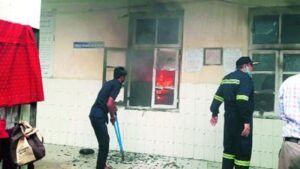The nation reacted with shock to the recent Jhansi, Uttar Pradesh fire disaster. The hospital fire resulted in the death of at least eleven newly born babies. The horrific accident started an intense debate about the security standards for fire safety in India.
The occurrence of fires within healthcare facilities has existed for many years. Various tragic disasters have taken place in previous years without leading to any meaningful improvement. All hospitals, together with other institutions, must adhere to established strict fire safety regulations. In spite of safety protocols, several facilities work without taking safety measures. Why? The existing system fails to work properly because corruption heavily influences its operations. Building owners manage to obtain fire safety certificates in situations where their facilities do not fulfil the standard requirements.
The major challenge in firefighting runs deep from insufficiently trained personnel. The global safety standards determine that a nation should have one firefighter for every 1,000 citizens in its population. As a nation, India does not meet the appropriate minimum guidelines for the number of firefighter personnel. Inadequately trained personnel create conditions where fires become more challenging to control, thus resulting in increased destruction and more losses of life.

Modern fire safety equipment remains one of the main ongoing problems throughout the nation. Public buildings, alongside more hospital facilities, lack essential fire safety equipment that includes various alarm systems as well as water sprinklers and emergency access points. The equipment goes unutilised because it either fails to operate appropriately or remains unmaintained when emergencies strike.
Help arrived late at the Jhansi Hospital fire site despite the urgency for assistance. The time consumed before the arrival of emergency assistance intensifies damage in fire-related events. Speedy reaction during emergencies saves lives, yet the absence of suitable resources makes this difficult to achieve.
Urgent steps for intervention must come from state government authorities. Unauthorised approval for hospitals, together with public facilities, exists only after conducting rigorous fire safety inspections. Any hospital building construction must adhere to necessary regulatory standards before final approvals will be given. The fire departments need to obtain advanced tactical training while receiving state-of-the-art firefighting equipment. The government needs to step up its efforts to spread fire safety knowledge to general public audiences. Basic safety measures that include open exits in combination with fire alarm installations can stop people from dying in fires.
The Jhansi tragedy serves as a warning sign to every people. Our mistakes cannot be repeated because doing so will cost more lives. People must see fire safety as a vital aspect worth dedication rather than something put off until later. Acting immediately enables us to stop upcoming disasters and safeguard human life.
